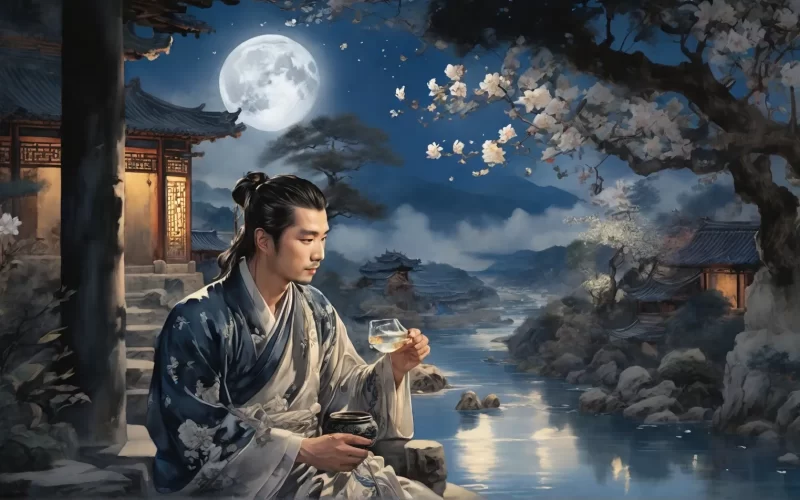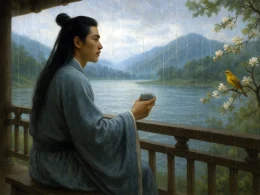Master, I hail you from my heart, And your fame arisen to the skies. Renouncing in ruddy youth the importance of hat and chariot, You chose pine-trees and cloud s; and now, white-haired, Drunk with the moon, a sage of dreams, Flower-bewitched, you are deaf to the Emperor High mountain, how I long to reach you, Breathing your sweetness even here!
Original Poem
「赠孟浩然」
李白
吾爱孟夫子,风流天下闻。
红颜弃轩冕,白首卧松云。
醉月频中圣,迷花不事君。
高山安可仰,徒此揖清芬。
Interpretation
This poem was likely composed during Li Bai's residence in Anlu, Hubei (727-736 AD), where he befriended Meng Haoran and developed a profound camaraderie. The work passionately celebrates Meng's indifference to fame and wealth, his noble self-possession, while expressing the poet's admiration and reflecting his own pursuit of spiritual freedom beyond worldly concerns.
First Couplet: "吾爱孟夫子,风流天下闻。"
wú ài mèng fū zǐ, fēng liú tiān xià wén.
How I revere Master Meng, Whose grace all the world doth sing.
The opening directly expresses reverence, presenting Meng's elegant character and extraordinary reputation with candid admiration.
Second Couplet: "红颜弃轩冕,白首卧松云。"
hóng yán qì xuān miǎn, bái shǒu wò sōng yún.
In youth he spurned officialdom's claim, Now white-haired, rests 'mid pines and cloudframe.
Juxtaposing "youth" and "white-haired," this couplet encapsulates Meng's lifelong eremitic spirit. "Rests 'mid pines and cloudframe" vividly depicts his reclusive ease, portraying a transcendent sage beyond worldly dust.
Third Couplet: "醉月频中圣,迷花不事君。"
zuì yuè pín zhòng shèng, mí huā bù shì jūn.
Moon-drunk, oft in holy trance, Flower-charmed, no courtly dance.
"Moon-drunk" and "flower-charmed" characterize Meng's lifestyle - intoxicated by nature's beauty yet unwilling to serve power, embodying the noble recluse's ethos.
Fourth Couplet: "高山安可仰,徒此揖清芬。"
gāo shān ān kě yǎng, tú cǐ yī qīng fēn.
Like mountains too lofty to scale, I can but bow to your fragrance pure and pale.
The mountain metaphor elevates Meng's virtue, while "bowing to fragrance" conveys heartfelt veneration through exquisite imagery.
Comprehensive Analysis
Using symbolic portraiture, the poem extols Meng's reclusive life, free from officialdom, expressing both praise and deep friendship. Its clear structure progresses methodically: the opening states the theme, the second couplet summarizes Meng's life pursuit, the third details his reclusion, and the finale concludes with profound respect. Blending realism with subjective passion, the verses bring Meng's persona to vivid life.
Artistic Innovations
- Progressive emotional layers: From admiration to depiction of reclusive life, culminating in worshipful praise.
- Parallel perfection: Couplets like "Moon-drunk…Flower-charmed" demonstrate impeccable parallelism with rich symbolism.
- Symbolic nature imagery: Mountains embody virtue; "pure fragrance" symbolizes noble character, enhancing pictorial and philosophical depth.
Insights
More than panegyric, this work articulates the poet's yearning for spiritual freedom and transcendence over worldly gains. In modern life's chase after fame and profit, Meng's choice reminds us true freedom lies in mental serenity and self-realization. Through this heartfelt tribute, Li Bai simultaneously declares his own refusal to fawn on power while pursuing moral purity - an ethos retaining timeless relevance for contemporary reflection.
Poem translator
Kiang Kanghu
About the poet

Li Bai (李白), 701 - 762 A.D., whose ancestral home was in Gansu, was preceded by Li Guang, a general of the Han Dynasty. Tang poetry is one of the brightest constellations in the history of Chinese literature, and one of the brightest stars is Li Bai.












